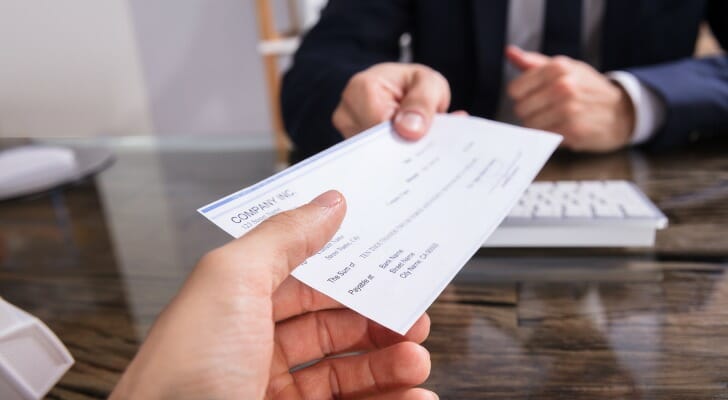There are a few options when you need a secure way of paying for something. Sure, cash is king, but not everyone feels safe carrying a thick wad around. Cashier’s checks and money orders are two of the more secure options for making a payment. Each comes with its own set of advantages and disadvantages. Let’s start by defining cashier’s checks vs. money orders and going over their individual pros and cons. Consider working with a financial advisor as you decide where to put your money.
What’s a Cashier’s Check?
A cashier’s check is a check issued and guaranteed by a bank or credit union. Unlike a personal check, a cashier’s check comes directly out of the bank’s funds instead of your checking account. These checks are more secure than personal checks for both parties as they are fully backed by the bank. That makes them great for large purchases, such as closing costs on a house or buying a car.
To get a cashier’s check, you’ll need the exact amount, your ID and the recipient’s name. You’ll be able to order one at your local branch or potentially online. You’ll need to pay the bank the amount of the cashier’s check, plus whatever fees they may charge. Cashier’s check fees may be discounted or waived for certain accountholders. If you do a lot of business with a bank or credit union, it doesn’t hurt to ask.
Lastly, get a receipt as proof of purchasing the check. You’ll be able to use your receipt to track when the check is cashed.
Pros of Cashier’s Checks
- Great for large purchases: Cashier’s checks are best used for purchases over $1,000.
- Are more secure than money orders: Cashier’s checks generally have more security features than money orders. And while there are cashier’s check scams, there are fewer compared to money orders.
Cons of Cashier’s Checks
- Higher fees than a money order: A cashier’s check can cost between two and 10 times more than a money order.
- You must have access to a financial institution that will write your check: This can be a problem if you don’t have a checking account, have recently moved or are on vacation.
What’s a Money Order?
Like a personal check, a money order is a paper certificate. However, instead of being backed by your bank account, it’s guaranteed by the company or organization that issues it. This makes it a more secure way of payment than a personal check.
You can get a money order at a variety of places. One big issuer of money orders is the United States Postal Service (USPS), but many grocery stores, pharmacies, check-cashing businesses and banks also offer them. Money orders are typically capped at $1,000 or less.
To fill out a money order you’ll need many of the same details as you would for a cashier’s check: amount, recipient’s name and your ID. Remember to keep the receipt and use it to monitor when the money order was cashed.
Pros of Money Orders
- Lower fees: Money order fees are often between $1 and $2 each.
- No access to financial institutions needed: If you don’t have a bank or your bank branch isn’t nearby, you can still easily get a money order.
Cons of Money Orders
- Shouldn’t be used for large purchases: Money orders max out at $1,000, so anything over that will require multiple money orders.
- Not as secure as cashier’s checks: Money orders have fewer security features than cashier’s checks and are more susceptible to scams.
Cashier’s Check vs. Money Order: What’s the Difference?
There are several differences when talking about cashier’s checks vs. money orders. Here are the major ways in which they differ:
- Where you purchase them: Cashier’s checks are issued and purchased at banks or credit unions where you’re a member. On the other hand, money orders can be purchased at stores, post offices and banks.
- Who backs it: Cashier’s checks are backed by the financial institution that issued them. Money orders are backed by the retail store, bank or post office where they were purchased.
- Fees: Cashier’s checks cost $10 or more to purchase, whereas money orders can be purchased for as little as $1.
- Size of purchase: Money orders often have a purchase limit of $1,000 or less. Cashier’s checks generally don’t have an upper limit.
Which Should You Use When?
Cashier’s checks and money orders are two types of secure payment options. Both are suitable when you don’t want to carry around a briefcase full of money or the person you’re paying doesn’t want to risk a bouncing check.
How much money a person needs and whether they have access to a bank account will dictate whether a cashier’s check or money order is best. Cashier’s checks, which require a bank account, are for large payments of more than $1,000. While money orders are available in more places and do not require a bank account, they’re for purchases of $1,000 or less.
So, if you need to put a down payment on a house, go to your bank and get a cashier’s check. However, if you’re buying an $800 antique lamp off Craigslist while on vacation, use a money order.
The Bottom Line
When talking about cashier’s checks vs. money orders, it’s clear that each has its purpose. You can get a money order at many more places than a cashier’s check. They’re cheaper and they don’t require a bank account. However, cashier’s checks are more secure and are perfect for large purchases or payments.
Tips for Big Spending
- If you’re considering making a big purchase and need some unbiased advice, look into finding a financial advisor. They’ll be able to guide you in what to do and whether the purchase makes sense for you. Finding a qualified financial advisor doesn’t have to be hard. SmartAsset’s free tool matches you with up to three financial advisors who serve your area, and you can interview your advisor matches at no cost to decide which one is right for you. If you’re ready to find an advisor who can help you achieve your financial goals, get started now.
- Maybe you’re not ready to spend yet, but you have things you want to save for. SmartAsset’s savings calculator can help you get there. Whether it’s a down payment on a house, a vacation or just building your emergency savings, it’s always a good time to save.
Photo credit: ©iStock.com/AndreyPopov, ©iStock.com/simonkr, ©iStock.com/AsiaVision


